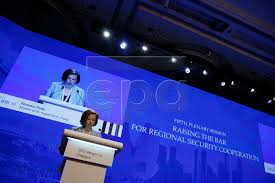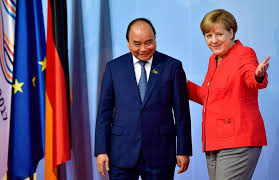 The 2018 edition of the Shangri-La Dialogue saw a strong convergence among leading European countries and the US for stronger cooperation to counter China’s attempts to alter the status quo in the South China Sea. While refusing to single out China by name, the defence ministers of France and Britain spoke about defending the rules-based maritime order.
The 2018 edition of the Shangri-La Dialogue saw a strong convergence among leading European countries and the US for stronger cooperation to counter China’s attempts to alter the status quo in the South China Sea. While refusing to single out China by name, the defence ministers of France and Britain spoke about defending the rules-based maritime order.
“By exercising our freedom of navigation, we also place ourselves in the position of a persistent objector to the creation of any claim to de facto sovereignty on the islands,” said French Defence Minister Florence Parly. “We have to make it clear that nations need to play by the rules, and there are consequences for not doing so,” said British Secretary of State for Defence Gavin Williamson.
Against this backdrop, Manish Chand, Editor-in-Chief of India and the World magazine and India Writes Network, spoke to Dr Johann David Wadephul, Member of German Bundestag, for Germany’s perspective on the contentious issue of South China Sea and Germany’s strategy of dealing with an ascendant China.
 Wadephul is Deputy Chairman of the CDU/CSU Parliamentary Group for Foreign Affairs, Defence Policy and Council of Europe. Wadephul has been a Member of the German Bundestag since the 2009 elections.
Wadephul is Deputy Chairman of the CDU/CSU Parliamentary Group for Foreign Affairs, Defence Policy and Council of Europe. Wadephul has been a Member of the German Bundestag since the 2009 elections.
In the run-up to form a coalition government under the leadership of Chancellor Angela Merkel following the 2017 federal elections, Wadephul was part of the working group on foreign policy, led by Ursula von der Leyen, Gerd Müller and Sigmar Gabriel.
(Excerpts from the interview)
Q) You play an important role in shaping foreign policy positions of the CDU/CSU. Promoting and protecting freedom of navigation has been a cross-cutting theme at the Shangri-La conference. What’s your reaction to latest developments in South China Sea?
 A) We support freedom of navigation and the rule of law. Issues and disputes in South China Sea should be resolved in accordance with the law of the sea. The European Union has to work together with Asia and ASEAN countries for this. The European Union needs to collaborate in strategizing and development of infrastructure. Our recommendation to Asia would be to strengthen ASEAN and to have a closer cooperation among countries in the region.
A) We support freedom of navigation and the rule of law. Issues and disputes in South China Sea should be resolved in accordance with the law of the sea. The European Union has to work together with Asia and ASEAN countries for this. The European Union needs to collaborate in strategizing and development of infrastructure. Our recommendation to Asia would be to strengthen ASEAN and to have a closer cooperation among countries in the region.
However, we need one head to talk to. That’s what Henry Kissinger told Europe: “I need one telephone no. to call”. At the end of the day, we need one telephone number in ASEAN
Q) In his keynote address at the Shangri-La Dialogue, India’s Prime Minister Narendra Modi, without overtly mentioning China, provided a critique of the Belt and Road project by stressing on respect for sovereignty of other countries. What’s German’s view of the BRI and engagement with China
A) Five years ago, everybody in Germany would have had a positive view on Chinese activities and China’s investments in Germany and Europe. Today, we are very skeptical because they want to perpetuate their economic and political influence in Germany and Europe. They are not respecting sovereignty of other countries. The BRI is very important but it is also controversial for us. The problem is they (China) do not believe in reciprocity. The Chinese can engage in our market and our economy as much as they want, but they do not allow our companies to engage in their market. The Chinese do not follow reciprocity
Q) What’s your strategy of dealing with China?
A) For us it’s a bargain. China is gaining and we have been exploring ways to engage China in a balanced manner. But the time for naivete is over. Washington, Delhi, Berlin and London have similar concerns. What is our reaction? Germany has a coalition, and in our treaty, we have written down that we have to find a European and German answer to dealing with China. But we do not have the answer right now. We Europeans have to work together, we have to work with countries we share values with like Japan, India and Australia. For this reason, we need to connect with the Quad. The Quad is a good format for the region
 Q) Germany and India have a robust multi-faceted relationship. How do you see the future trajectory of this relationship?
Q) Germany and India have a robust multi-faceted relationship. How do you see the future trajectory of this relationship?
A) We have a positive view of India – we have good relations. We appreciate how you organize the greatest democracy. We expect that India strengthens its efforts to become more efficient in economic, political and military matters. We hope we will engage with India more. Germany is on India’s side.
Author Profile

- Manish Chand is Founder and Editor-in-Chief of India Writes Network (www.indiawrites.org) and India and World, a pioneering magazine focused on international affairs. He is CEO, Centre for Global India Insights, an India-based think tank focused on global affairs.
Latest entries
 India and the WorldFebruary 17, 2026South-by-South: Focus on people-centric solutions at India AI summit
India and the WorldFebruary 17, 2026South-by-South: Focus on people-centric solutions at India AI summit India and the WorldFebruary 7, 2026Modi hails interim India-US trade deal, Goyal says no concessions made on agriculture
India and the WorldFebruary 7, 2026Modi hails interim India-US trade deal, Goyal says no concessions made on agriculture India and the WorldFebruary 2, 2026Trump announces trade deal with India, Modi ‘delighted’
India and the WorldFebruary 2, 2026Trump announces trade deal with India, Modi ‘delighted’ India and the WorldJanuary 31, 2026Palestinian minister bats for mediatory role for India in ending Gaza conflict
India and the WorldJanuary 31, 2026Palestinian minister bats for mediatory role for India in ending Gaza conflict







